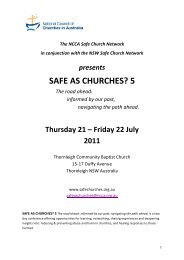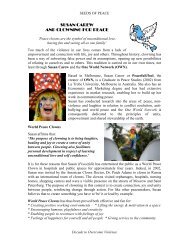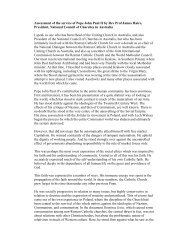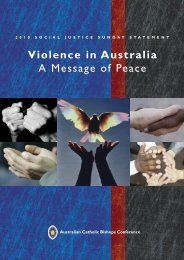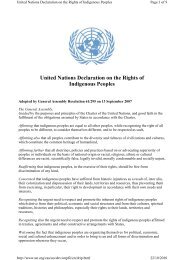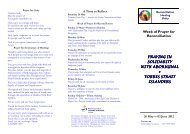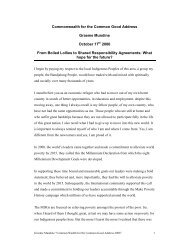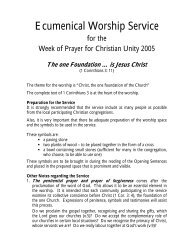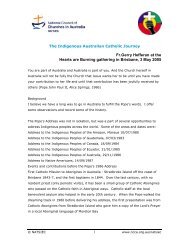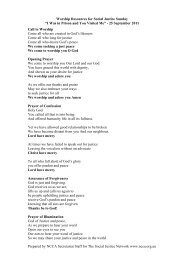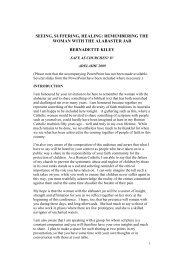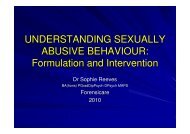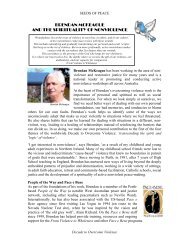introducing the theme
introducing the theme
introducing the theme
You also want an ePaper? Increase the reach of your titles
YUMPU automatically turns print PDFs into web optimized ePapers that Google loves.
Global resources for <strong>the</strong> Week of prayer for Christian Unity 2011One in <strong>the</strong> apostles’ teaching, fellowship, breaking of bread and prayer. (Acts 2 : 42 – 47)Introduction to <strong>the</strong> <strong>the</strong>me for <strong>the</strong> year 2011The church in Jerusalem, yesterday, today, tomorrowTwo thousand years ago, <strong>the</strong> first disciples of Christ ga<strong>the</strong>red in Jerusalem experienced <strong>the</strong> outpouring of<strong>the</strong> Holy Spirit at Pentecost, and were joined toge<strong>the</strong>r in unity as <strong>the</strong> body of Christ. In that event,Christians of every time and place see <strong>the</strong>ir origin as a community of <strong>the</strong> faithful, called toge<strong>the</strong>r toproclaim Jesus Christ as Lord and Saviour. Although that earliest Jerusalem church experienceddifficulties, both externally and internally, its members persevered in faithfulness and fellowship, inbreaking bread and prayers.It is not difficult to see how <strong>the</strong> situation of <strong>the</strong> first Christians in <strong>the</strong> Holy City mirrors that of <strong>the</strong> churchin Jerusalem today. The current community experiences many of <strong>the</strong> joys and sorrows of <strong>the</strong> early church;its injustice and inequality, and its divisions, but also its faithful perseverance, and recognition of a widerunity among Christians.The churches in Jerusalem today offer us a vision of what it means to strive for unity, even amid greatproblems. They show us that <strong>the</strong> call to unity can be more than mere words, and indeed that it can pointus toward a future where we anticipate and help build <strong>the</strong> heavenly Jerusalem.Realism is required to make reality of such a vision. The responsibility for our divisions lies with us; <strong>the</strong>yare <strong>the</strong> results of our own actions. We need to change our prayer, asking God to change us so that we mayactively work for unity. We are ready enough to pray for unity, but that can become a substitute for actionto bring it about. Is it possible that we ourselves are blocking <strong>the</strong> Holy Spirit because we are <strong>the</strong> obstaclesto unity; that our own hubris prevents unity?The call for unity this year comes to churches all over <strong>the</strong> world from Jerusalem, <strong>the</strong> mo<strong>the</strong>r church.Mindful of its own divisions and its own need to do more for <strong>the</strong> unity of <strong>the</strong> Body of Christ, <strong>the</strong> churchesin Jerusalem calls all Christians to rediscover <strong>the</strong> values that bound toge<strong>the</strong>r <strong>the</strong> early Christiancommunity in Jerusalem, when <strong>the</strong>y devoted <strong>the</strong>mselves to <strong>the</strong> Apostles’ teaching and fellowship, to <strong>the</strong>breaking of bread and <strong>the</strong> prayers. This is <strong>the</strong> challenge before us. The Christians of Jerusalem call upon<strong>the</strong>ir bro<strong>the</strong>rs and sisters to make this week of prayer an occasion for a renewed commitment to work fora genuine ecumenism, grounded in <strong>the</strong> experience of <strong>the</strong> early Church.Four elements of unityThe 2011 prayers for <strong>the</strong> Week of Prayer for Christian Unity have been prepared by Christians inJerusalem, who chose as a <strong>the</strong>me Acts 2:42, ‘They devoted <strong>the</strong>mselves to <strong>the</strong> apostles’ teaching andfellowship, to <strong>the</strong> breaking of bread and <strong>the</strong> prayers.’ This <strong>the</strong>me is a call back to <strong>the</strong> origins of <strong>the</strong> firstchurch in Jerusalem; it is a call for inspiration and renewal, a return to <strong>the</strong> essentials of <strong>the</strong> faith; it is acall to remember <strong>the</strong> time when <strong>the</strong> church was still one. Within this <strong>the</strong>me four elements are presentedwhich were marks of <strong>the</strong> early Christian community, and which are essential to <strong>the</strong> life of <strong>the</strong> ChristianCommunity wherever it exists. Firstly, <strong>the</strong> Word was passed on by <strong>the</strong> apostles. Secondly, fellowship(koinonia) was an important mark of <strong>the</strong> early believers whenever <strong>the</strong>y met toge<strong>the</strong>r. A third mark of <strong>the</strong>early Church was <strong>the</strong> celebration of <strong>the</strong> Eucharist (<strong>the</strong> ‘breaking of <strong>the</strong> bread’), remembering <strong>the</strong> NewMaterials jointly prepared and published byThe Pontifical Council for Promoting Christian UnityThe Commission on Faith and Order of <strong>the</strong> World Council of Churches1
Global resources for <strong>the</strong> Week of prayer for Christian Unity 2011Covenant which Jesus has enacted in his suffering, death and resurrection. The fourth aspect is <strong>the</strong>offering of constant prayer. These four elements are <strong>the</strong> pillars of <strong>the</strong> life of <strong>the</strong> church, and of its unity.The Christian Community in <strong>the</strong> Holy Land wishes to give prominence to <strong>the</strong>se basic essentials as itraises its prayers to God for <strong>the</strong> unity and vitality of <strong>the</strong> church throughout <strong>the</strong> world. The Christians ofJerusalem invite <strong>the</strong>ir sisters and bro<strong>the</strong>rs around <strong>the</strong> world to join <strong>the</strong>m in prayer as <strong>the</strong>y struggle forjustice, peace and prosperity for all people of <strong>the</strong> land.The <strong>the</strong>mes of <strong>the</strong> eight daysThere is a journey of faith that can be discerned in <strong>the</strong> <strong>the</strong>mes of <strong>the</strong> eight days. From its first beginningsin <strong>the</strong> upper room, <strong>the</strong> early Christian community experiences <strong>the</strong> outpouring of <strong>the</strong> Holy Spirit, enablingit to grow in faith and unity, in prayer and in action, so that it truly becomes a community of <strong>the</strong>Resurrection, united with Christ in his victory over all that divides us from each o<strong>the</strong>r and from him. Thechurch in Jerusalem <strong>the</strong>n itself becomes a beacon of hope, a foretaste of <strong>the</strong> heavenly Jerusalem, called toreconcile not just our churches but all peoples. This journey is guided by <strong>the</strong> Holy Spirit, who brings <strong>the</strong>early Christians to <strong>the</strong> knowledge of <strong>the</strong> truth about Jesus Christ, and who fills <strong>the</strong> early Church withsigns and wonders, to <strong>the</strong> amazement of many. As <strong>the</strong>y continue <strong>the</strong>ir journey, <strong>the</strong> Christians of Jerusalemga<strong>the</strong>r with devotion to listen to <strong>the</strong> Word of God set forth in <strong>the</strong> apostles’ teaching, and come toge<strong>the</strong>r infellowship to celebrate <strong>the</strong>ir faith in sacrament and prayer. Filled with <strong>the</strong> power and hope of <strong>the</strong>Resurrection, <strong>the</strong> community celebrates its certain victory over sin and death, so that it has <strong>the</strong> courageand vision to be itself a tool of reconciliation, inspiring and challenging all people to overcome <strong>the</strong>divisions and injustice that oppress <strong>the</strong>m.Day 1 sets forth <strong>the</strong> background to <strong>the</strong> mo<strong>the</strong>r church of Jerusalem, making clear its continuity with <strong>the</strong>church throughout <strong>the</strong> world today. It reminds us of <strong>the</strong> courage of <strong>the</strong> early church as it boldly witnessedto <strong>the</strong> truth, just as we today need to work for justice in Jerusalem, and in <strong>the</strong> rest of <strong>the</strong> world.Day 2 recalls that <strong>the</strong> first community united at Pentecost contained within itself many diverse origins,just as <strong>the</strong> church in Jerusalem today represents a rich diversity of Christian traditions. Our challengetoday is to achieve greater visible unity in ways that embrace our differences and traditions.Day 3 looks at <strong>the</strong> first essential element of unity; <strong>the</strong> Word of God delivered through <strong>the</strong> teaching of <strong>the</strong>apostles. The church in Jerusalem reminds us that, whatever our divisions, <strong>the</strong>se teachings urge us todevote ourselves in love to each o<strong>the</strong>r, and in faithfulness to <strong>the</strong> one body which is <strong>the</strong> church.Day 4 emphasises Sharing as <strong>the</strong> second expression of unity. Just as <strong>the</strong> early Christians held all things incommon, <strong>the</strong> Church in Jerusalem calls upon all bro<strong>the</strong>rs and sisters in <strong>the</strong> church to share goods andburdens with glad and generous hearts, so that nobody stays in need.Day 5 expresses <strong>the</strong> third element of unity; <strong>the</strong> Breaking of <strong>the</strong> Bread, which joins us in hope. Our unitygoes beyond Holy Communion; it must include a right attitude towards ethical living, <strong>the</strong> human personand <strong>the</strong> whole community. The Jerusalem church urges Christians to unite in “<strong>the</strong> breaking of bread”today, because a divided church cannot speak out with authority on issues of Justice and Peace.Materials jointly prepared and published byThe Pontifical Council for Promoting Christian UnityThe Commission on Faith and Order of <strong>the</strong> World Council of Churches2
Global resources for <strong>the</strong> Week of prayer for Christian Unity 2011Day 6 presents <strong>the</strong> fourth mark of unity; with <strong>the</strong> church in Jerusalem, we draw strength from spendingtime in prayer. Specifically, <strong>the</strong> Lord’s Prayer calls all of us in Jerusalem and throughout <strong>the</strong> world, <strong>the</strong>weak and <strong>the</strong> mighty, to work toge<strong>the</strong>r for justice, peace and unity that God’s Kingdom may come.Day 7 takes us beyond <strong>the</strong> four elements of unity, as <strong>the</strong> Jerusalem church joyfully proclaims <strong>the</strong>Resurrection even while it bears <strong>the</strong> pain of <strong>the</strong> Cross. The Resurrection of Jesus is for Christians inJerusalem today hope and strength that enables <strong>the</strong>m to remain constant in <strong>the</strong>ir witness, working forfreedom and peace in <strong>the</strong> City of Peace.Day 8 concludes <strong>the</strong> journey with a call from <strong>the</strong> Jerusalem churches to <strong>the</strong> wider service ofreconciliation. Even if Christians achieve unity among <strong>the</strong>mselves, <strong>the</strong>ir work is not done, for <strong>the</strong>y needto reconcile <strong>the</strong>mselves with o<strong>the</strong>rs. In <strong>the</strong> Jerusalem context this means Palestinian and Israeli; in o<strong>the</strong>rcommunities, Christians are challenged to seek justice and reconciliation in <strong>the</strong>ir own context.The <strong>the</strong>me of each day has <strong>the</strong>refore been chosen not only to recall for us of <strong>the</strong> history of <strong>the</strong> earlychurch, but also to bring to mind <strong>the</strong> experiences of Christians in Jerusalem today, and to invite us all toreflect upon how we may bring that experience into <strong>the</strong> lives of our local Christian communities. Duringthis journey of eight days, <strong>the</strong> Christians of Jerusalem invite us to proclaim and bear witness that Unity -in its fullest sense of faithfulness to <strong>the</strong> Apostles’ teachings and fellowship, to <strong>the</strong> breaking of bread, and<strong>the</strong> prayers - will enable us toge<strong>the</strong>r to overcome evil, not just in Jerusalem, but throughout <strong>the</strong> world.The preparation of <strong>the</strong> material for <strong>the</strong> Week of Prayer for Christian Unity 2011The initial work leading to <strong>the</strong> publication of this booklet was done by a group of Christian leaders fromJerusalem. They ga<strong>the</strong>red at <strong>the</strong> invitation of <strong>the</strong> World Council of Churches. Their work was facilitatedby <strong>the</strong> Jerusalem Inter-Church Centre. We want to thank in particular those who have contributed:His Beatitude <strong>the</strong> Latin Patriarch Emeritus, Michel SabbahHis Grace Bishop Munib Younan, of <strong>the</strong> Evangelical Lu<strong>the</strong>ran Church in Jordan and <strong>the</strong> Holy LandRev. Naim Ateek, of <strong>the</strong> Episcopal Church in Jerusalem and <strong>the</strong> Middle EastRev. Frans Bouwen, of <strong>the</strong> Roman Catholic ChurchFr Alexander, of <strong>the</strong> Greek Orthodox Patriarchate of JerusalemFr Jamal Khader, of <strong>the</strong> University of BethlehemMr Michael Bahnam, of <strong>the</strong> Syrian Orthodox Patriarchate of AntiochMs Nora Karmi, of <strong>the</strong> Armenian Orthodox ChurchMr Yusef Daher, of <strong>the</strong> Greek Catholic Melkite Church.Materials jointly prepared and published byThe Pontifical Council for Promoting Christian UnityThe Commission on Faith and Order of <strong>the</strong> World Council of Churches3
Global resources for <strong>the</strong> Week of prayer for Christian Unity 2011The texts proposed here were finalized during <strong>the</strong> meeting of <strong>the</strong> international preparatory groupappointed by <strong>the</strong> World Council of Churches Faith and Order Commission and <strong>the</strong> Pontifical Council forPromoting Christian Unity, of <strong>the</strong> Roman Catholic Church.The meeting of <strong>the</strong> international preparatory group took place at <strong>the</strong> St. Christophorus Monastery inSaydnaya, Syria. Participants wish to extend <strong>the</strong>ir thanks to his Beatitude Ignatius IV, Greek OrthodoxPatriarch of Antioch and his staff in Damascus and Saydnaya for <strong>the</strong>ir warm welcome and gracioushospitality, and to church leaders from different Christian traditions for <strong>the</strong>ir support and encouragement.jointly prepared and published by <strong>the</strong> Pontifical Council for Christian Unity and <strong>the</strong> Commission on Faithand Order of <strong>the</strong> World Council of Churches.Materials jointly prepared and published byThe Pontifical Council for Promoting Christian UnityThe Commission on Faith and Order of <strong>the</strong> World Council of Churches4



